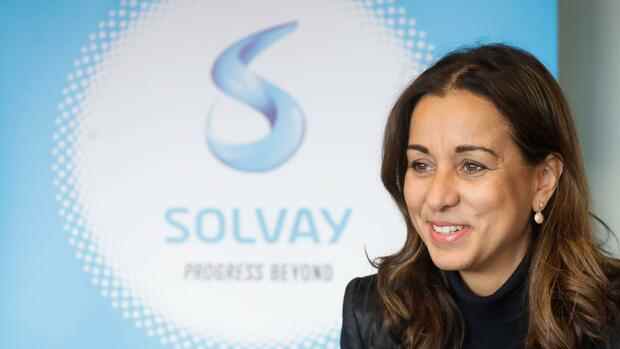The doctor of chemistry has led the Belgian group since 2019.
(Photo: imago images/Belga)
Dusseldorf Ilham Kadri is held in high esteem by her predominantly male industry colleagues for this sentence: “Chemistry is the mother of all industries,” says Solvay’s CEO. In other words: Without chemistry as a supplier of materials, nothing works in the green transition of the economy – and if this is to succeed, the chemistry itself must first change.
At Solvay, one of the largest specialty chemicals manufacturers in Europe with a turnover of ten billion euros, the Moroccan-born woman is driving this change forward: She is fully gearing the Belgian group towards sustainability and the circular economy, i.e. the material recycling of chemicals and plastics.
The 53-year-old does not shy away from drastic changes. On Tuesday morning, it announced the split of Solvay into two separate publicly traded companies. She is reacting to the different business models within the group – and wants to make it even clearer what the chemical company wants to stand for in the future.
Kadri’s focus is on the businesses that Solvay will spin off into a new company with the working title Specialty Co. This is where high-performance plastics and other materials for the lightweight construction of e-cars, airplanes and medical technology are going. In the coming years, the Group intends to increasingly produce these materials from renewable raw materials and with chemical recycling.
Top jobs of the day
Find the best jobs now and
be notified by email.
Make products and processes more sustainable
The partly bio-based ingredients for food and consumer goods will also migrate to this new company. Overall, the “Specialty Co” has a turnover of around six billion euros. It brings together businesses that innovate for Solvay customers to make their products and processes more sustainable.
The new “Essential Co” with around four billion euros is more about mass and size. This new company will retain Solvay’s traditional chemical businesses. These include the manufacture of soda ash (sodium carbonate), peroxide and silica. In these deals, the focus is more on costs. In the future, they should primarily generate cash so that they can get involved in the global consolidation of the chemical industry through takeovers.
The group is still 30 percent in the hands of the founding family.
(Photo: Reuters)
Two different worlds, then, which are also evident in many other European chemical companies. However, many shy away from a split, as Solvay plans to do by 2023. But CEO Kadri was also ahead of many of his competitors with other strategic decisions.
The doctor of chemistry was one of the first executives from the chemical industry to publicly support the EU Commission’s “Green Deal”. Brussels wants to make Europe climate-neutral and strengthen the circular economy and sustainable production. In 2019, Kadri started with precisely these goals in order to reform the almost 160-year-old Solvay Group.
“Europe could be a shining example for the rest of the world on how we protect our planet and rethink chemistry,” says Kadri. At Solvay, she wants to combine economic success with environmental protection and diversity. She manages according to meritocratic principles: Only performance counts, not origin or gender.
Kadri’s vision is called “Solvay One Planet”: climate protection, resource conservation and a better life are the goals. After that, she describes, every business area, every production facility is aligned – and it should go hand in hand with economic growth. “When you recycle waste, it is no longer waste,” says Kadri.
Kadri demonstrates willingness to act
The Solvay boss is strongly influenced by her grandmother, who raised her in humble circumstances in Casablanca. “I grew up with the conviction that we cannot afford to waste natural resources.” Kadri studied chemistry in France, worked for large chemical companies in Europe and the USA, and made it into top management.
With the split that has now been decided, the chemical manager is once again demonstrating her will to act. She is aware that she cannot just leave it at words. Kadri is currently experiencing how quickly a company can be attacked when it comes to sustainability when dealing with a hedge fund.
The activist fund Bluebell Capital has accused the company of dumping waste from an Italian soda factory into the sea. Solvay accuses Bluebell of ignorance and explains that this is natural limestone and that all legal regulations are complied with. Both sides are currently exchanging blows with public letters.
That Kadri stumbles over it is considered unlikely. The board of directors of the Solvay Group, which is still 30 percent family-owned, supports her because, as required, she has developed a “motivating vision” for the group.
More: “Flank god of German industry” – You should pay attention to these six chemical companies in 2022
